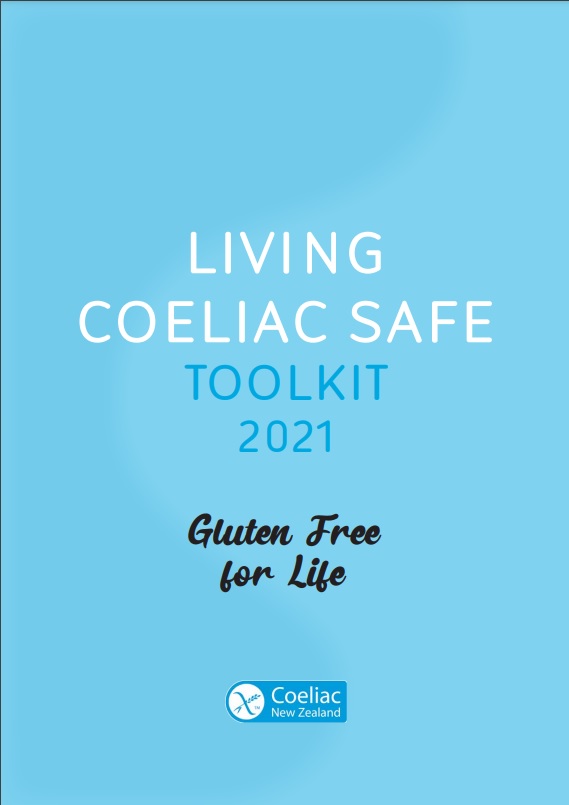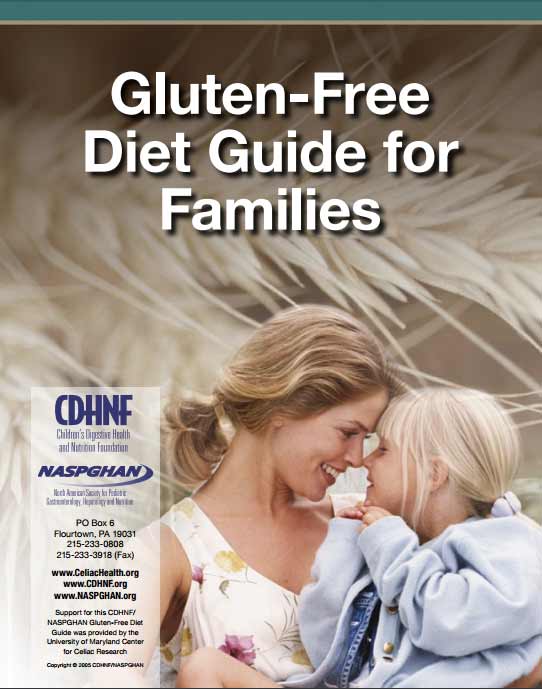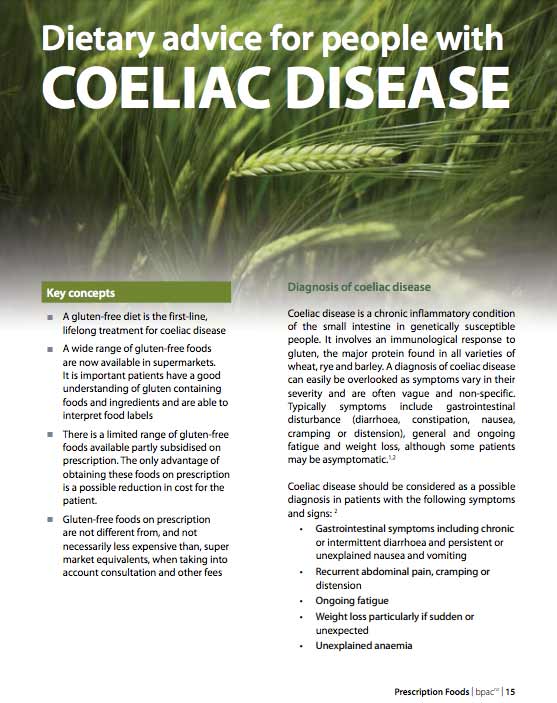Coeliac disease overview
Sounds like 'see-lee-ak'
Key points about coeliac disease
- Coeliac disease (also spelled celiac disease) mainly affects the part of the gut called the small intestine.
- It is a permanent intestinal reaction to gluten (a protein in barley, wheat, rye and oats).
- With coeliac disease, the immune response causes cells lining the small bowel (intestine) to become damaged and inflamed
- If you have a child with coeliac disease see our page on coeliac disease in children.
- Coeliac disease can develop at any stage in life. It has a strong genetic tendency, so often runs in families.
- A strict gluten free diet is the only effective treatment for people with confirmed coeliac disease.

VIDEO: What is coeliac disease?
What is coeliac disease ?(Coeliac New Zealand, 2021)
Coeliac disease (also spelled celiac disease) mainly affects the part of the gut called the small intestine. It is a permanent autoimmune disorder that causes a reaction to gluten. The autoimmune reaction causes flattening of the tiny, finger like projections, called villi, which line the inside of the bowel. This affects the absorption of important nutrients including iron, folic acid, calcium and fat-soluble vitamins.
Gluten is a protein that is found in many grains such as wheat, barley, and rye and the protein avenin is found in oats. Coeliac NZ suggests you avoid oats because when they are processed there is the risk of cross-contamination of gluten from other cereals. Food Standards Australia New Zealand (FSANZ) require the absence of barley, wheat, rye and oats to make a gluten free claim on manufactured products.
A good way to remember what to avoid is BROW – Barley, Rye, Oats and Wheat.
These grains are often used to make breads, pasta and cereals. Because many corn and rice products are produced in factories that also manufacture wheat products, they can also be contaminated with wheat gluten.
Hidden sources of gluten include additives such as modified food starch, preservatives and stabilisers made with wheat. Gluten may also be found in everyday products such as medicines, vitamins and lip balms.
A medical diagnosis of coeliac disease is key to managing and improving your health. If you suspect you have coeliac disease, it is important to first talk to your doctor. It can take some time before symptoms are identified as being caused by coeliac disease as not all people have typical symptoms.
Because the presentation of coeliac disease is so variable, and may in fact lead to only minimal symptoms, many people don't know they have it. Understanding the symptoms and tests available will help your GP make the correct diagnosis. Remember to mention if a relative has coeliac disease or dermatitis herpertiformis, or if you or a family member has been treated for anaemia. People with a first degree relative with coeliac disease (parent, child or sibling) have a 1 in 10 risk of also developing the disease.
Coeliac disease can be controlled with diet
The change to a gluten free diet after diagnosis with coeliac disease can have a significant positive impact on your wellbeing. Remember there are many naturally gluten free foods you can eat that are healthy and delicious.
A good place to start is to focus on shopping the perimeter of your grocery store (vegetables, fruits, fish, poultry, meats, rice, legumes and plain dairy products) and choose gluten free grains, eg, quinoa, brown rice, millet, amaranth, and buckwheat.
The symptoms of coeliac disease are different for everyone. They can be similar to those of several other conditions, such as irritable bowel syndrome, which can complicate diagnosis.
Symptoms in adults
In adults, common symptoms include:
- Diarrhoea (hamuti, runny poo), which may begin at any age and is often present for years prior to diagnosis. It may first appear after other illnesses such as a tummy bug (gastroenteritis) or following significant health events such as surgery or pregnancy and childbirth.
- Tiredness, weakness and lack of energy.
- Weight loss.
- Constipation (some people are more likely to experience constipation rather than diarrhoea).
- Flatulence (wind, gas) and abdominal tightness.
- Cramping and bloating.
- Nausea and vomiting.
Anaemia is also more common in people with coeliac disease, particularly anaemia due to iron or folic acid deficiency. The anaemia will either not respond to treatment or will come back after treatment until the underlying cause (eg, coeliac disease) is identified and treated.
Less commonly, as an adult you may experience:
- Easy bruising of your skin.
- Ulcerations and/or swelling of your mouth and tongue.
- Miscarriages and infertility.
- Low blood calcium levels with muscle spasms.
- Vitamin B12, A, D, E and K deficiencies.
- Skin rashes such as dermatitis herpetiformis.
- Altered mental alertness.
- Bone and joint pains.
Symptoms in children
In children, symptoms do not appear until gluten-containing foods are introduced into the diet. It is also possible for symptoms to appear later. See our page on coeliac disease in children.
The common symptoms include:
- Large, bulky, foul-smelling bowel movements (poo, tūtae).
- Diarrhoea (hamuti) or constipation.
- Poor weight gain.
- Weight loss in older children.
- Iron deficiency anaemia.
- Stunted growth.
- Bloated tummy, pain and flatulence.
- Nausea and vomiting.
- Irritability.
Dermatitis Herpetiformis
Dermatitis herpetiformis (also known as DH or Duhring’s disease) is a chronic, intensely itchy, blistering skin condition which is also caused by an immune reaction to eating gluten. It may or may not be associated with other coeliac disease symptoms but is linked to coeliac disease. The name herpetiformis comes from the tendency for blisters to appear in clusters, resembling herpes simplex. However, dermatitis herpetiformis is not due to this viral infection. Everyone with DH also has coeliac disease. Read more about dermatitis herpetiformis.(external link)(external link)
Having coeliac disease is different to being gluten-intolerant.
Some people who do not have coeliac disease also avoid gluten in their diet. This is because they have found that foods containing gluten make them feel generally unwell, possibly with bloating and tummy pain. They are ‘gluten intolerant’ but they do not develop inflammation in their gut.
(Patient Info, UK, 2018)
Coeliac disease is caused by an abnormal reaction by your immune system to the protein gluten, but it isn't well understood why this sensitivity develops.
- Your immune system mistakes gluten as a threat to the body and, in an attempt to protect your body from the threat, it creates special gluten-fighting antibodies to fight it.
- In your gut, these antibodies cause inflammation and flattening of tiny, finger-like projections called villi, which line the inside of your small intestine (also known as small bowel).
- The villi are responsible for absorbing nutrients and minerals from food.
- Damage of the villi can lead to nutritional deficiencies – low levels of iron, folic acid and calcium.
If undiagnosed, the condition can cause long-term poor health and other less common effects including:
- osteoporosis (due to reduced dietary calcium absorption)
- iron deficiency anaemia
- infertility
- miscarriage
- depression
- dental enamel defects
- increased chance of cancers of your oesophagus and gastrointestinal (gut) tract.
It's important to see your doctor if you think you may have the condition.
Coeliac disease can develop at any stage in life, from infancy to old age. It occurs in family groups and has a strong genetic tendency.
- Around 10% (1 in every 10) of all first-degree relatives (parents, brothers, sisters or children) of people with coeliac disease also have the condition.
- If one identical twin is affected, the other twin is almost certain to be affected.
Coeliac disease can develop in babies, while older children or adults who have not previously had problems may also become gluten-sensitive at some point in their lives and develop coeliac disease. It is not known why the immune system of some people becomes sensitive to gluten. There is no evidence that stress or the use of antibiotics triggers coeliac disease.
The gold standard for diagnosis is a positive blood test and finding small bowel abnormalities if duodenal biopsies are performed while the patient is still consuming gluten. Children/tamariki may sometimes be diagnosed with coeliac disease without a duodenal biopsy based on blood test results that strongly suggest they have the condition. They should be referred to a paediatrician or paediatric gastroenterologist for formal diagnosis. If coeliac disease is suspected, a blood test will be advised by your doctor. This is done to look for certain antibodies that are present in the blood of a person with coeliac disease. If they are present then more tests may be needed. Read more about testing for coeliac disease.(external link)(external link)
Important: It is vital to keep eating gluten for at least 6 weeks before your blood test. If a gluten free diet is started before diagnosis, this may affect the accuracy of investigations such as blood tests and biopsies. Feeling better on a gluten free diet is not enough to confirm the diagnosis of coeliac disease.
If the blood test is positive then you may be referred to a specialist who may arrange for you to have a gastroscopy and for a biopsy to be taken.
A gastroscopy(external link)(external link) is a way to look inside the stomach and the upper part of the gut with a thin flexible tube (endoscope). A biopsy is a procedure in which a small sample of tissue is taken. For coeliac disease testing, the biopsy is taken from the inside lining of the beginning of the gut (duodenum) during the gastroscopy. The sample is looked at with a microscope to see if the typical changes of coeliac disease are present.
Other tests may also be done to find out if poor absorption of food and nutrients has affected you eg, blood tests for anaemia or a special bone scan.
There is no known cure for coeliac disease. A strict gluten free diet is the only effective treatment for people with confirmed coeliac disease. There are no medicines to treat it, but medicines may be needed to treat comorbidities, eg, iron deficiency.
- A gluten-free diet means a lifelong, no-exceptions diet, leaving out all foods containing wheat, rye, barley, triticale and oats. It is essential that you avoid the risk of cross-contamination in food storage and preparation.
- Oats can cause a reaction in some people with the condition, so they are not safe to include in a gluten free diet even if they are labelled as ‘gluten free oats’.
- Children and younger people recover quite quickly after starting a gluten-free diet (usually within 6 months), but older people may take longer to recover.
- Nutrients such as iron, folic acid and some vitamins may need to be replaced at the start of treatment.
- It can be a good idea to cut down on cow’s milk in your diet at first, so your bowel can build up its levels of the enzyme lactase, which helps you digest the lactose in dairy products. Read more about lactose intolerance.
If you have coeliac disease and eat gluten, you can continue to sensitise and damage the gut. For this reason, you must stay on a strict gluten-free diet for life.
You should get advice from a dietitian to find out which foods are suitable. Your doctor or specialist may also advise you to take some vitamins, iron and calcium supplements for the first 6 months or more following diagnosis. This is to replace any deficiencies while the gut lining is returning to normal.
Apps reviewed by Healthify
You may find it useful to look at some Digestive health apps.
If you have untreated coeliac disease you are at greater risk of developing long-term health conditions such as osteoporosis and some forms of cancer. This is because it is likely there is a common gene link between these conditions. The increased risk of these conditions usually reduces if you follow a strict gluten-free diet. Read more about the conditions associated with coeliac disease.(external link)
So if you have coeliac disease, talk to your GP if you have further concerns or additional symptoms.
For more information, contact Coeliac New Zealand(external link)(external link) because it is a support group for adults and children with coeliac disease. Coeliac New Zealand are the voice for coeliac disease in Aotearoa New Zealand and are here to support those with coeliac disease and their whānau. When you become a member you receive advice throughout your coeliac journey. As part of the CNZ community, you’ll gain valuable advice and assistance when you need it. Your subscriptions also help provide the resources needed to work with health professionals, gluten free manufacturers, and researchers to advocate and raise awareness of coeliac disease in NZ.
They provide:
- A welcome pack containing information on the condition, the gluten free diet, where to shop, recipes and helpful advice to make the change from gluten to gluten-free as easy as possible.
- A conference once every 2 years.
- A dedicated Coeliac Link magazine with informative articles and contributions from experts and ambassadors as well as lived experience stories from members published twice a year.
- Regular messaging to members.
- An informative website.
- A gluten free food safety training certificate.
- A dining out accreditation programme for safe gluten free dining.
- Health promotion programmes and toolkits.
- Resources you can purchase including a wellbeing journal.
You may be able to get a subsidy for your gluten-free food and a disability allowance to help with your health-related costs. Read about subsidies and allowances for people with coeliac disease.(external link)(external link) Remember the change to a gluten free diet after being diagnosed with coeliac disease can have a significant positive impact on your wellbeing.
Video: Gluten free for life
This video may take a few moments to load.
(Coeliac NZ, 2018)
Video: Living with coeliac disease – the less spoken about topics
This video may take a few moments to load.
(Coeliac NZ, 2022)
Video: Don’t pass the bread
Don’t Pass the Bread focuses on life after diagnosis, when drastic lifestyle changes are required both within and outside of the home. From afar, the requirement seems simple: don't eat gluten nor traces of gluten. However, in a world where gluten is in sauces, meats, and make-up, where simple family gatherings are rife with gluten contamination, and when sharing a bag of chips can lead to days of sickness, the disease can affect one’s social and mental health. This video may take a few moments to load.
(Coeliac New Zealand, 2021)
What is coeliac disease?(external link) Coeliac NZ
Coeliac disease videos(external link) Coeliac NZ Youtube
How do you eat gluten-free?(external link) Coeliac NZ
Coeliac disease(external link) PatientInfo, US
Gluten-free diet and food label reading guide(external link) celiac.org
Coeliac disease (multi-lingual factsheets)(external link) Coeliac Australia
Brochures
Living coeliac safe toolkit(external link) Coeliac New Zealand, 2021
Gluten-free diet guide for families(external link) Children's Digestive Health & Nutrition Foundation, USA, 2006
Dietary advice for people with coeliac disease(external link) BPAC, NZ, 2011
Dermatitis herpetiformis(external link) Coeliac New Zealand, 2019
Apps
References
- Coeliac disease(external link) PatientInfo, US, 2018
- Coeliac disease – investigation and management(external link) BPAC, NZ, 2022
- Tests and diagnosis(external link) Coeliac NZ
- Coeliac disease – associated conditions(external link) Coeliac Australia
In this webinar series, Coeliac New Zealand’s Medical Advisory Panel dietitian talks about the symptoms and immunological responses to gluten in adults and children with coeliac disease.
Webinar 1: What are the symptoms and causes of coeliac disease?(external link)
Webinar 2: Diagnosis and treatment of coeliac disease(external link)
Webinar 3: The gluten free diet and sources of cross contamination(external link)
Webinar 4: Advice for reading food labels(external link)
Webinar 5: Understanding nutrient deficiencies(external link)
Webinar 6: Follow up care and wellbeing following diagnosis(external link)
See our page Long-term conditions for healthcare providers
Clinical resources
Dietary advice for people with coeliac disease(external link) BPAC, NZ, 2011
Diagnosis information for health professionals(external link) Coeliac NZ
PHARMAC part subsidy for gluten-free food(external link) Coeliac NZ
Coeliac disease diagnosis and management videos(external link) Coeliac NZ
Coeliac disease self-assessment tool Coeliac NZ
Coeliac disease(external link) B-QuiCK BPAC, NZ
Continuing medical education - seminars
Gastroenterology update(external link)
Apps
Brochures

Coeliac New Zealand, 2021

Children's Digestive Health & Nutrition Foundation, USA, 2006
Credits: Healthify editorial team. Healthify is brought to you by Health Navigator Charitable Trust.
Reviewed by: Wendy Bremner, Pou Whakahaere General Manager, Coeliac New Zealand
Page last updated:






